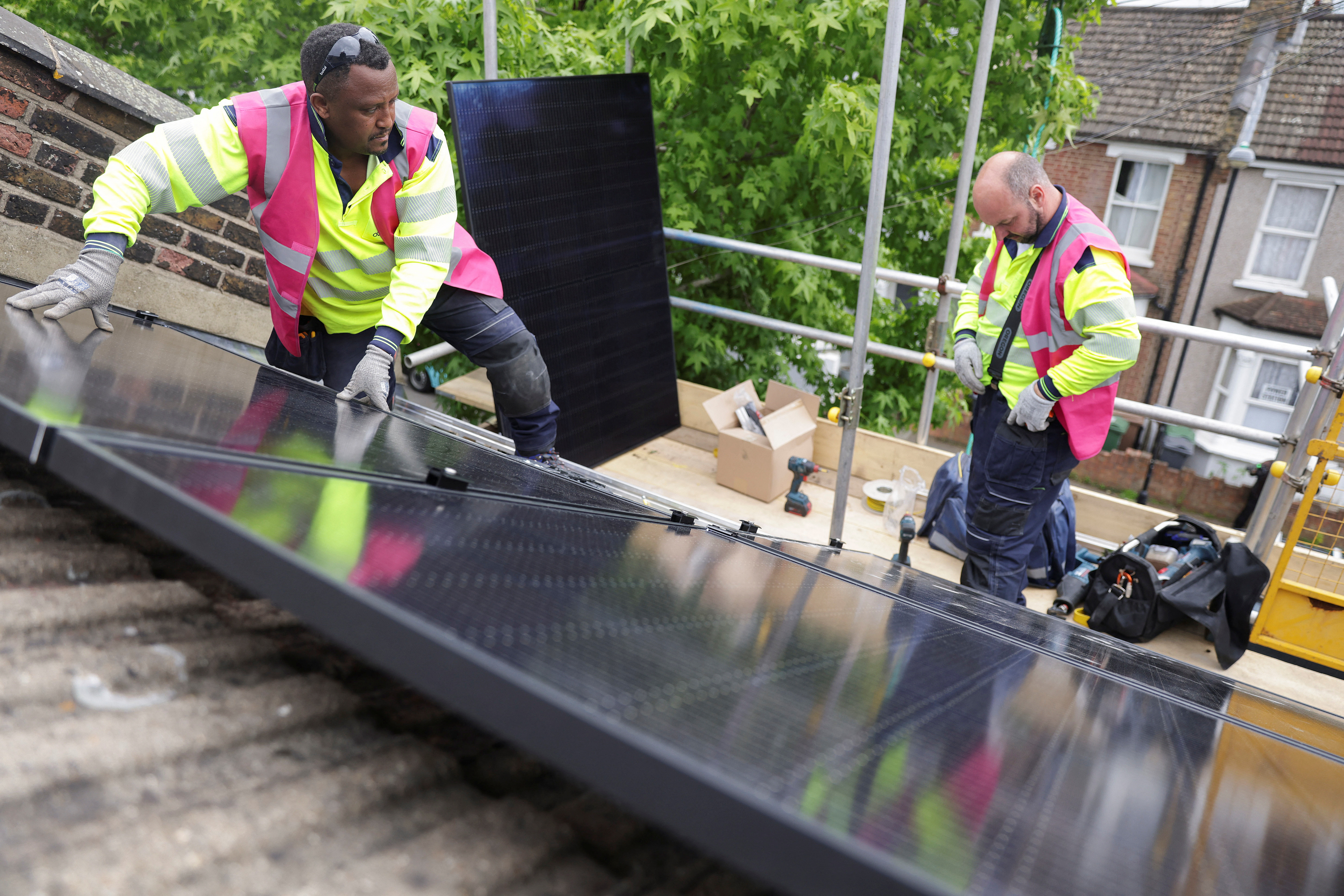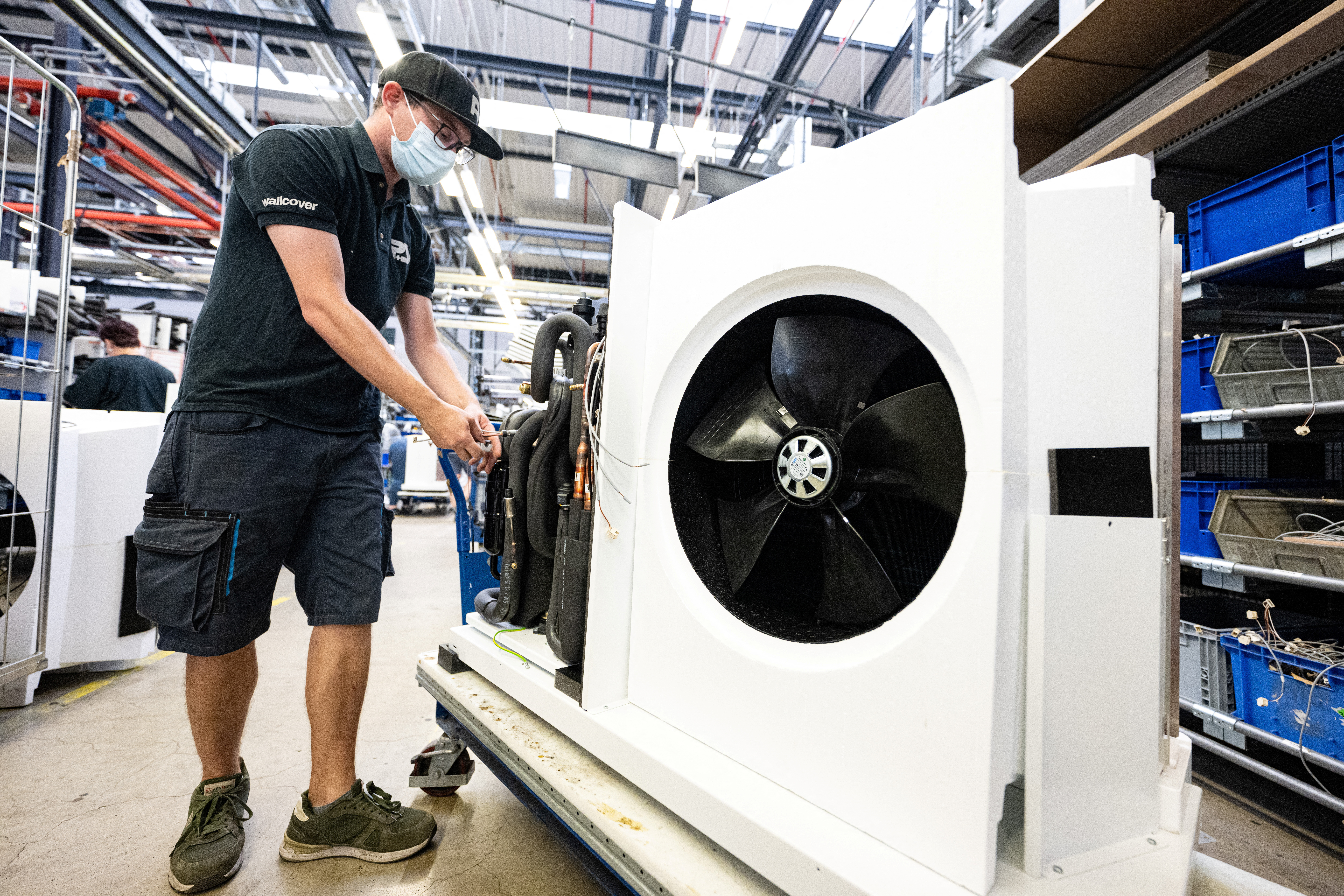Students write beside a wall with a mural featuring wind turbines at a school in the Dominic Republic ahead of the second phase of construction of a nearby wind farm. REUTERS/Ricardo Rojas Acquire Licensing Rights
November 27 - The global energy system is unfair on consumers. Most of us are at the mercy of volatile international fossil fuel markets. We’re forced to rely on polluting energy that’s distributed through inadequate grids. And it’s expensive. Many people around the world are having to choose between eating or powering their homes. At the same time, the fossil fuel giants are enjoying a boom. Last year, the five largest Western oil and gas companies made a combined profit of $200 billion. The disparity is unconscionable. The U.N. climate summit, COP28, in Dubai is the moment to push for a radical transformation of the global energy system. We need to disrupt the traditional “command and control” model of energy production, which makes us dependent on centralised fossil-fuelled power plants. In its place, we need a new consumer-focused model, which enables ordinary people to stop being mere passive energy recipients and become generators, storers and users of renewable energy at home. The global energy crisis has trigged a sharp acceleration in low-carbon energy production, although investment in fossil fuels continues to climb. Renewables are now the most inexpensive form of power, but few households are seeing the benefits in their bills. This must change. In most cases, they are seeing the opposite. In 2022, consumers around the world faced unprecedented rises in their energy bills, linked to fossil-fuel dependence and Russia’s invasion of Ukraine. Around the world, 90% of consumer advocacy experts reported increasing energy prices for consumers over the course of 2022, with a fifth reporting the price more than doubling. This burden has pushed an estimated 141 million people into extreme poverty . This must change. The International Energy Agency recently called the transition to renewable energy “unstoppable”, but we cannot have a shift in which ordinary people are left behind. By their very nature, renewables offer the chance for secure, local and affordable energy production – not least because people can produce them at home.

Solar panels are installed on the roof of a house in London as part of a plan to turn the street into a mini power station. REUTERS/Anna Gordon Acquire Licensing Rights Empowering consumers to install clean energy solutions, like solar panels, batteries, smart meters, and efficient electric heating and cooling, in their properties would reduce their emissions and lower, or even wipe out, their bills. In Europe, switching to smart heat pumps alone will reduce consumers’ heating costs by up to 25% compared with gas. In rural areas of sub-Saharan Africa, installing a simple solar lantern causes consumers’ lighting expenditures to fall by 85% . It would also restructure the nature of energy production. We would be swapping a top-down, linear model for a mutually beneficial two-way dynamic. As we move to the age of mass electrification, this change is essential. We need consumers to be able to create their own energy, so power grids don’t fail in the face of unprecedented demand. Energy made at home at scale would offer grids much-needed flexibility and resilience. Already, household investment in climate measures – largely in the form of electric vehicle, solar panel and energy efficiency purchases – is almost double the amount invested by all the world’s governments. The potential for future growth is huge. Putting solar panels on all the world’s rooftops could generate 27 petawatts of electricity a year – the equivalent of the planet’s total current global electricity use. In India, deploying just one third of the country’s residential rooftop solar potential could power all of its homes. These consumers have the ultimate insurance policy against surging fossil fuel prices: the ability to generate their own electricity at marginal cost and to use, store or share it, as suits them. What’s more, these consumers can access a growing stack of money-saving opportunities.

A worker assembles a heat pump at the Stiebel Eltron plant in Holzminden, Germany. REUTERS/Benjamin Westhoff Acquire Licensing Rights Good things are starting to happen: Currently, 83 countries have feed-in-tariffs , which pay consumers a premium for supplying home-generated electricity to the local energy grid. In more than 40 countries, people can also get paid for providing much-needed flexibility to their grid. In Australia, one utility company has looped together over 276,000 solar panels and connected devices into a virtual power plant, allowing consumers to save and share energy. Another Australian company is offering consumers that install its solar panels and battery storage a guarantee of zero electricity bills for seven years. But there remain many barriers to home-grown renewables, including a lack of impartial information and advice, prohibitive upfront installation costs and a lack of qualified installers. Consumers are being asked to give their consumption data to suppliers they may not heard of or trust. In this context, policymakers must urgently create the legislation that will drive the home-generated energy revolution. We need fair financing, like loans with favourable terms, to help people install renewable energy tech. Dedicated financial products – such as green mortgages that give better interest rates to homes with solar panels or energy efficiency measures – are necessary too. Fair prices for exporting electricity, shifting consumption away from peak times and sharing it with other consumers are crucial. For all of this to happen, national governments need to create well-functioning markets with efficient price signals. Some countries will need to also offer grants and subsidies for renewables until markets bring prices down further. The shift to renewables is a one-off opportunity to democratise the global energy system. It’s not just about fitting expensive tech in affluent homes but unleashing a transition to people-powered energy across the globe, from Albania to Zimbabwe. The home-generated energy revolution is how to cut consumers’ bills and emissions – while also making our energy system fairer and more resilient. The time has come to put energy in the hands of the people. Opinions expressed are those of the author. They do not reflect the views of Reuters News, which, under the Trust Principles, is committed to integrity, independence, and freedom from bias. Ethical Corporation Magazine, a part of Reuters Professional, is owned by Thomson Reuters and operates independently of Reuters News.

Helena Leurent Helena Leurent is director general of Consumers International, the membership organisation for 200+ consumer advocacy groups around the world in more than 100 countries. Consumers International works with members and partners to empower consumers, to ensure consumers are treated safely, fairly and honestly worldwide, and to drive change in the marketplace on global consumer issues including digital access and rights, product safety and sustainability.













